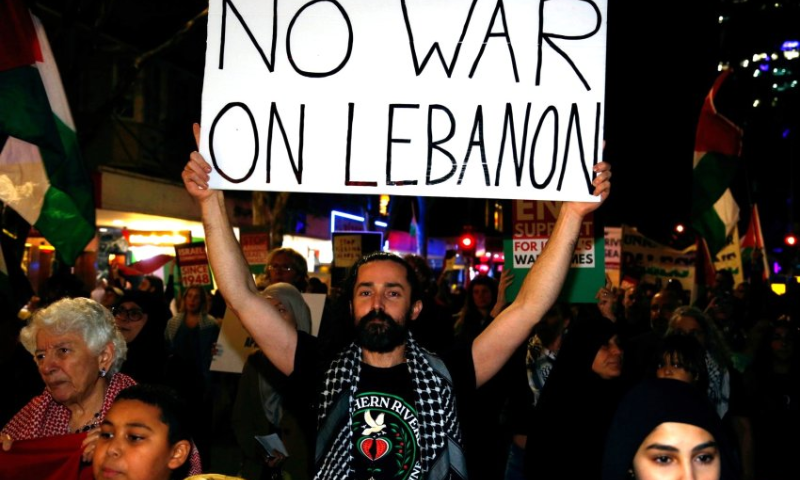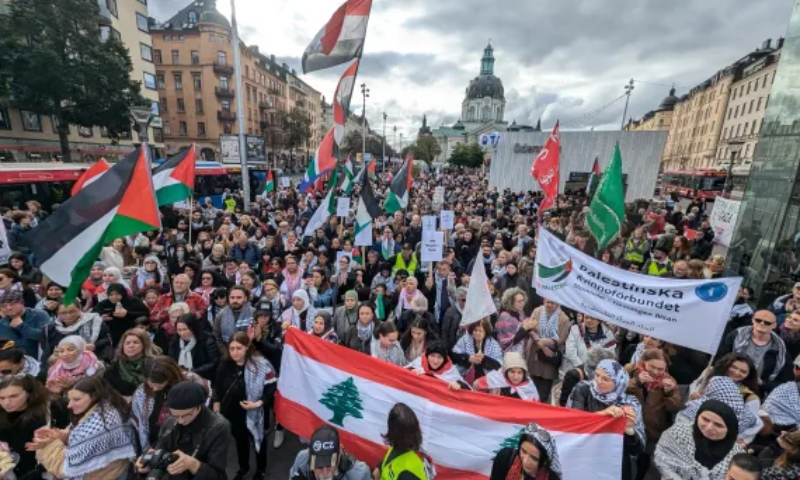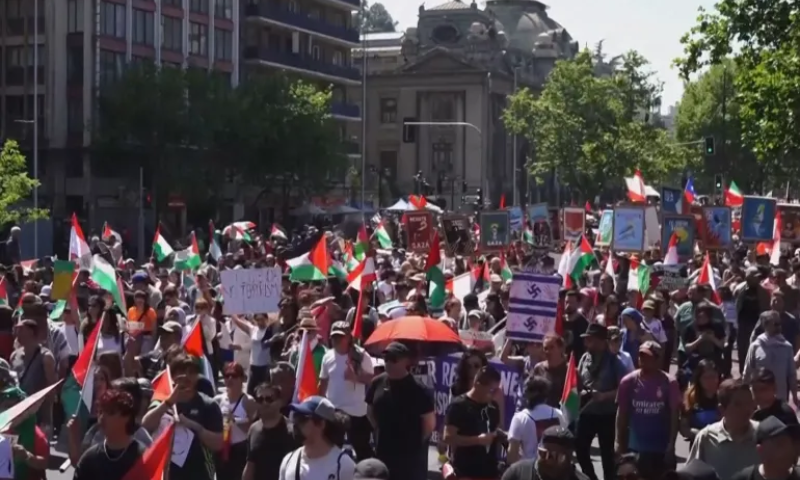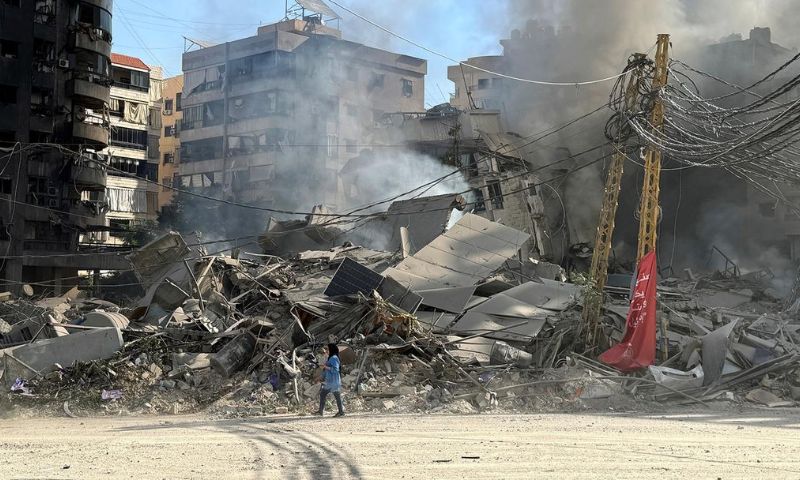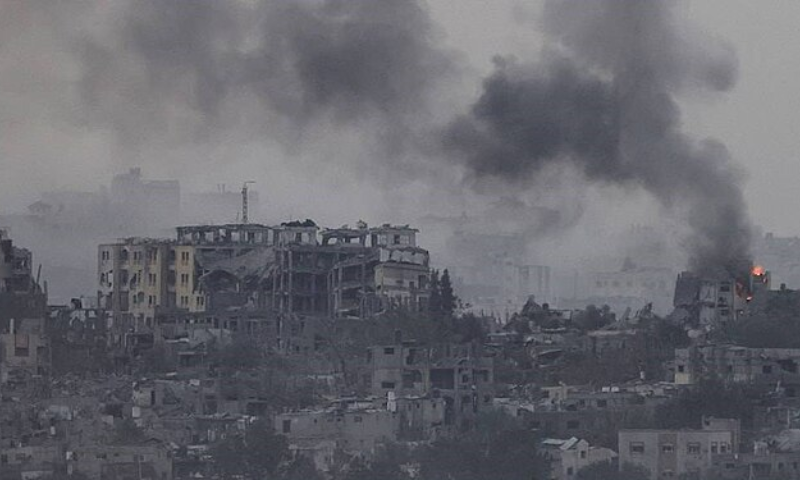BEIRUT: The skies over Beirut were illuminated by massive fireballs on Sunday as Israel launched a wave of intense strikes on Lebanon amid weekend large protests in major cities across the world demanding an end to Israeli bombardment and ceasefires in Gaza and Lebanon.
Smoke billowed over the city, and explosions rocked southern Beirut, prompting the Lebanese government to appeal for an immediate ceasefire.
Israel launched the heaviest bombardment in weeks across Lebanon to target Hezbollah, a long-standing ally of Hamas, ahead of the anniversary of Hamas’s October 7 attack on Israel. The Lebanese National News Agency reported that over 30 Israeli airstrikes targeted Hezbollah’s stronghold in southern Beirut, hitting a petrol station, a medical supplies warehouse, and other critical infrastructure.
“The strikes were like an earthquake,” said Mehdi Zeiter, a 60-year-old shopkeeper in the area. Meanwhile, scores of civilians fled Beirut’s southern suburbs, many on foot or motorbikes, as Israeli warplanes continued their bombardment.
Lebanon’s Prime Minister, Najib Mikati, urged the international community to intervene, calling for urgent pressure on Israel to halt the assault. Lebanese Education Minister Abbas Halabi announced that the start of the school year would be postponed until November 4 due to security concerns.
In Gaza, the Israeli military said it had encircled the Jabaliya area in northern Gaza, where intelligence reports suggested that Hamas was working to rebuild its operational capabilities despite months of devastating Israeli airstrikes.
Israeli military spokesperson Rear Admiral Daniel Hagari warned that the country was bracing for potential attacks on Monday, the anniversary of the Hamas assault on October 7, 2023.
Meanwhile, Hezbollah retaliated by launching rockets and assault drones at Israeli positions in the south. Hezbollah claimed to have fired artillery during an Israeli casualty evacuation. The Lebanese group said it lost contact with senior leader Hashem Safieddine following an Israeli airstrike.
The conflict between Israel and Hezbollah has already claimed more than 1,110 lives in Lebanon since September, based on official figures.
On Tuesday, Iran launched 200 missiles at Israel. The Iranian strikes, which followed Israel’s assassination of Hezbollah chief Hassan Nasrallah, damaged an Israeli air base. Iran has warned of further retaliation if Israel continues its offensive.
Despite mounting casualties and international calls for de-escalation, Israeli Prime Minister Benjamin Netanyahu signaled that his government would continue its military campaign. He reiterated that Israel “has the duty and the right to defend itself” and vowed to respond to any attacks.
Meanwhile, Iran’s Foreign Minister Abbas Araghchi renewed his call for ceasefires in both Gaza and Lebanon during a visit to Damascus. Araghchi warned Israel of a stronger response if it continued its aggression against Iran or its allies.
The humanitarian toll in Lebanon continues to rise, with the UN Refugee Agency (UNHCR) warning that the country is facing a “terrible crisis” as thousands of civilians are displaced or left destitute. At least four hospitals in Lebanon have been forced out of service due to the ongoing bombardments.
On the ground in Gaza, Israeli airstrikes have devastated large swaths of territory. Gaza’s civil defence agency reported that 26 people were killed on Sunday in a strike on a mosque in Deir al-Balah.
Since October last year, at least 41,870 Palestinians, mostly women and children, have been killed in Israeli airstrikes on Gaza, according to the Palestinian health ministry and the United Nations.
Ahead of Monday’s grim anniversary, thousands of demonstrators participated in pro-Palestinian rallies in cities worldwide, including London, Paris, and Cape Town. The protesters demanded ceasefires in Gaza and Lebanon and an end to Israeli bombardment.
In Washington, D.C., demonstrators gathered outside the White House, urging the U.S. government to cease military aid to Israel, as one man dramatically attempted to set himself on fire, only to be saved by quick intervention from bystanders and police.
READ ALSO: Iran Prepares Response to Possible Israeli Attack: Media
Across Europe, cities like Rome, Berlin, and London saw large-scale pro-Palestinian demonstrations. In Rome, the protest turned violent as bottles and firecrackers were thrown at the police, leading to the use of tear gas and water cannons.
In Berlin, authorities detained multiple individuals during the protests, while in London, over a thousand people gathered, resulting in at least 15 arrests. Protests were largely peaceful but underscored the growing frustration with the ongoing conflict in the Middle East, which has claimed more than 41,000 lives in Gaza alone, according to local health officials.
Beyond Europe, demonstrations also took place in countries like South Africa, Indonesia, Venezuela, and Australia, where thousands gathered to express their solidarity with Palestinians and call for an end to the violence. Protesters in Cape Town marched to parliament, while in Jakarta, Indonesia, thousands rallied outside the U.S. embassy.









